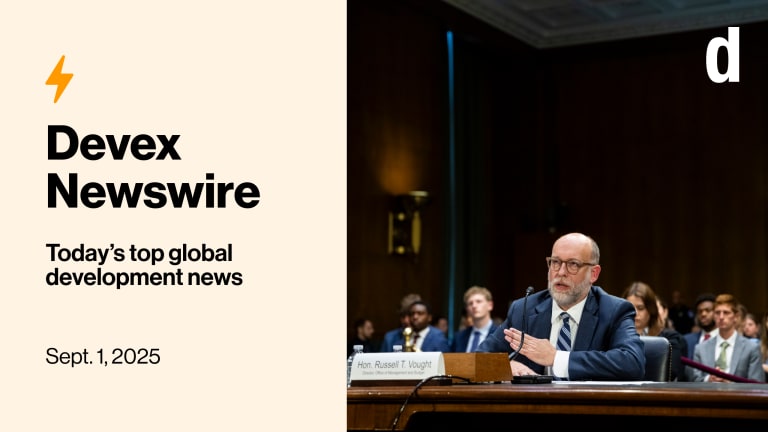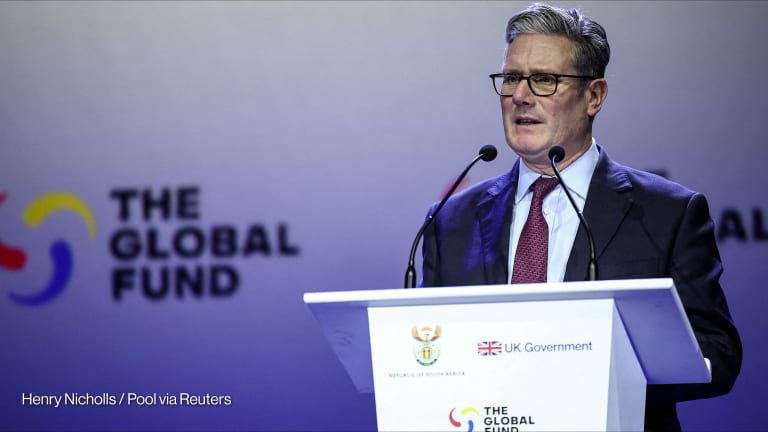
More details about the Trump foreign aid budget sent the U.S. development community reeling, donors came through with money for Yemen, while Ivanka Trump and the World Bank are combining forces for women’s empowerment. This week in development news.
President Trump’s pledge to slash foreign aid budgets took a more concrete form this week with the leak of a document outlining what a 30 percent cut to U.S. foreign affairs spending would look like. The U.S. Agency for International Development, under the spending plan obtained by Devex, takes a huge hit, with experts suggesting the administration’s proposed cuts would require the agency to close 30 to 40 of its missions, release roughly 20 percent of its staff, and cede much of its policy and programming to the State Department. Among the most significant elements of the budget described in this document is a shift of money from the “Development Assistance Fund,” which funds long-term development programs carried out by USAID, to “Economic Support Funds,” which are designed to carry out often short-term State Department interventions on behalf of American foreign policy. The general impression is that the Trump administration does not see development as a pillar of U.S. foreign policy. The president's complete budget request, expected in late May, will outline in more detail the argument behind the White House’s budget proposal to Congress. Since Congress ultimately determines the U.S. budget, the development community will no doubt continue to focus its advocacy efforts on key lawmakers in both parties who may mean the difference between a drastically reduced U.S. bilateral assistance effort and the preservation of programs around the world.
Donors pledged half of the United Nations’ requested $2.1 billion for Yemen at a pledging conference in Geneva on Tuesday, a welcome show of monetary support that belies a much more difficult challenge of delivering aid and stopping the conflict. Military alliances also complicate the picture. “In the end we reached half of the [UN] goal, but it’s clear that many of the governments here have one hand tied behind their back, either because of [arms] sales or direct involvement in the conflict,” a humanitarian relief representative told Devex. Humanitarian access to 17 million food insecure Yemenis is another massive obstacle, which the pledging conference did little to resolve. “We basically now need three things: access, access, and access,” said U.N. Secretary General António Guterres.
The World Bank and International Monetary Fund Spring Meetings wrapped up over the weekend. The bank used this gathering of finance ministers, political leaders, celebrities and activists to showcase its role as a global institution that can influence the ways that risk is distributed across the globe. In fragile and conflict-affected states, the bank wants to use its capital to drive down the risks of private investment, combining grant funding with its private sector tools. In places where an influx of refugees has put pressure on public services and jobs — such as Jordan and Lebanon — the bank is building more flexibility into its financing, so countries that could not previously access cheap money can do so more quickly. To drive more financing to infrastructure in developing countries, the bank is looking to derisk investments that might appeal to large pools of capital, such as pension funds and sovereign wealth funds. All of these ambitions are complicated by the fact that the World Bank’s largest shareholders are wary of upping their contributions to the bank, despite President Jim Yong Kim’s appeal for a general capital increase. That request was shelved until the World Bank annual meetings in October, but the U.S. Treasury Secretary’s recent statement on the issue left little reason to hope for new money anytime soon, at least from the U.S.
Meanwhile Ivanka Trump and the World Bank are reported to have worked out some kind of arrangement to create women’s empowerment fund at the bank. Trump will advocate for the project but not be involved in soliciting donations to it or in its operations, Bloomberg reported. Rumors about the fund circulated at last week’s meetings — as did concerns about how World Bank staff might react to a potential alliance between the institution and the first daughter, whose women’s empowerment credentials just met very mixed reactions from a skeptical crowd in Germany. The rollout of the fund could present a telling test case of the tricky line development leaders like Kim will have to walk in courting critical support from the White House.
Donna Shalala stepped down after two years as president and chief executive of the Clinton Foundation this week. She will return to teach at the University of Miami, where she was previously president. Shalala led the Clinton Foundation during the tumultuous 2016 U.S. presidential election, which saw attacks on Hillary Clinton’s relationships pull the foundation into an unwelcome spotlight. Shalala focused her leadership on maintaining effective development programs despite the political noise around the foundation. During Shalala’s tenure the foundation reviewed and restructured some of its programs, while the Clinton Global Initiative — an annual gathering of business and government leaders in New York — came to an end. Kevin Thurm, previously the foundation’s chief operating officer, will take over as acting CEO and Shalala will join the board.
Join the Devex community and access more in-depth analysis, breaking news and business advice — and a host of other services — on international development, humanitarian aid and global health.








